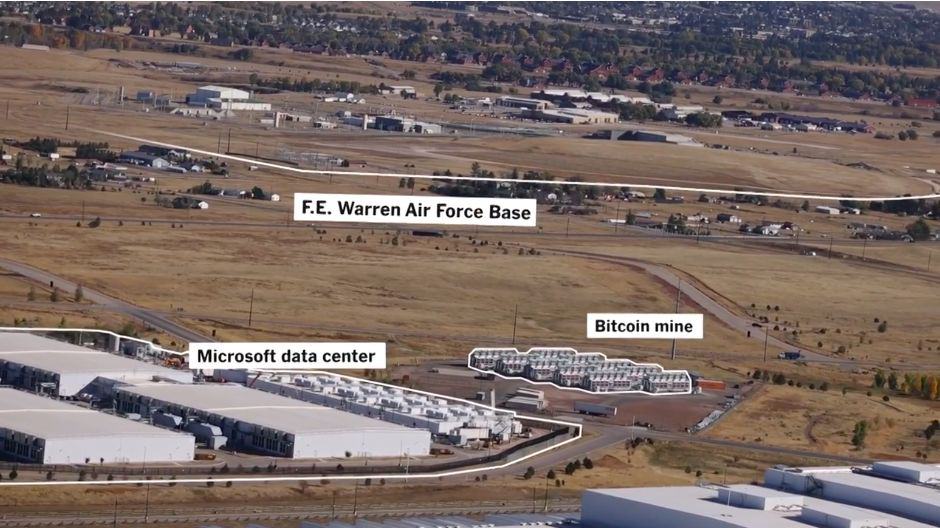The Growth of Chinese Bitcoin Mining in America Triggers National Data Security Worries
In Brief
Increasingly, Bitcoin mining activities associated with Chinese firms are making substantial progress across the United States, raising alarms about the implications for national security.
A mining facility in Cheyenne, Wyoming, is positioned near a Microsoft data center that provides support for the Pentagon and an Air Force base that controls nuclear missile operations.
Texas has emerged as a hotspot for Chinese Bitcoin miners, thanks to a unique mix of low electricity rates and a relaxed regulatory framework.

Chinese owned/operated Bitcoin mines In the United States, these mining operations have caused significant national security worries because of their closeness to crucial infrastructure and the risk of grid disruptions. There have been reports indicating that both Microsoft and U.S. officials are monitoring these operations These setups create potential risks for intelligence gathering and could lead to targeted power outages, primarily driven by Bitmain’s high-performance machines.
The site of a Chinese-associated crypto-mining venture in Cheyenne, Wyoming, is alarmingly close to a Microsoft data center supporting Pentagon activities, as well as an Air Force base overseeing nuclear-armed missiles. Microsoft’s security team has alerted the Committee on Foreign Investment regarding these potential threats.

While Microsoft has yet to uncover concrete evidence of malicious behavior, it cautions about various significant risk factors, particularly concerning the operations that consume vast amounts of energy. Microsoft’s security division has sounded alarms over the possible dangers linked to this close proximity, fearing it may facilitate extensive intelligence-gathering activities by Chinese interests.
Texas Emerges as a Hub for Chinese Bitcoin Mining
Numerous states across the U.S., such as Arkansas, Ohio, Oklahoma, Tennessee, Texas, and Wyoming, reportedly host Bitcoin mines owned or operated by Chinese firms, consuming energy comparable to that of 1.5 million households.
One notable Chinese-linked cryptocurrency mining operation, Poolin, runs two facilities in West Texas that have the capacity to consume up to 600 megawatts of power — enough electricity to power nearly 500,000 American homes. The founder of the company, Kevin Pan, who is of Chinese nationality, has expressed his appreciation for the welcoming atmosphere in Texas, highlighting the state's attractiveness to cryptocurrency miners.
In 2021, BBC published an article It's clear that Texas appeals to miners from China as the state offers a blend of affordable electricity and a lenient regulatory environment, making it an optimal location for their power-hungry operations. Furthermore, Texas has been embracing blockchain and cryptocurrency through regulatory acknowledgment, drawing in Chinese Bitcoin enterprises seeking stability and opportunity.
Governor Greg Abbott has lent his support to cryptocurrencies; coupled with the state's deregulated power market and low energy costs, this makes Texas a desirable spot. Other officials, including Senator Ted Cruz, have similarly advocated for cryptocurrencies, aiming for Texas to become a sanctuary for Bitcoin and blockchain innovation.
According to The New York Times, the Electric Reliability Council of Texas has noted that the energy demands of Bitcoin mining operations and their murky operational transparency have led to forecast errors, potentially exacerbating grid disturbances and compromising reliability. In response to these risks, new proposals have surfaced to regulate the pace at which these mines can ramp up or down their energy usage. Unlike traditional power producers and transmission firms, Bitcoin mining largely operates in an unregulated ‘gray zone.’
Energy Strain and Cybersecurity Issues Generate Concern
In spite of the heightened apprehensions regarding national security threats and energy sustainability, Chinese-affiliated Bitcoin mining operations in the United States are continuing to expand, presenting challenges and provoking debates in several states. potential disruptions to power grids Additionally, there is growing anxiety over the tremendous strain these mining activities place on electrical grids, as well as their participation in incentive programs designed to encourage shutdowns during peak demand, which could jeopardize overall grid stability.
A Chinese enterprise, pivotal in supplying mining equipment, has been enhancing its presence in the U.S. since China's prohibition on Bitcoin mining came into effect in May 2021. These operations have prompted alarm due to their colossal energy needs and the threat of cyber incursions on vital infrastructure. The intricate ownership frameworks of these mining sites often involve shell companies with affiliations to the Chinese Communist Party and its government.
Bitmain The swift expansion of Bitcoin mining operations linked to China, particularly those with ties to the Chinese government, has elicited serious worries about grid dependability and operational transparency, along with calls for regulatory oversight on energy consumption and practices. Notably, while some U.S. politicians welcome Bitcoin mining activities in Texas, the industry remains largely unregulated.
Regulatory Landscape for Cryptocurrencies and Bitcoin Mining in the U.S.
The regulatory atmosphere surrounding cryptocurrencies in the United States is complex and perpetually in flux. Both federal and state governmental bodies are striving to establish regulations, although overlapping responsibilities among agencies complicate the landscape.
Every state in the U.S. has the authority to devise its own regulations and licensing frameworks concerning digital assets. Although cryptocurrencies are widely accepted across all states, businesses operating in this domain may face variations in state-specific regulations and definitions.
Cryptocurrencies can be legally used in every U.S. state, however, certain jurisdictions may impose restrictions. Recently, some states have voiced concerns about the energy usage associated with cryptocurrency mining. For example, New York's Environmental Committee
Cryptocurrency mining is also permitted implemented a moratorium on proof-of-work mining in March 2022. proposed In late November, New York became the first state to enact a two-year moratorium on specific cryptocurrency mining practices. This law temporarily halts the permission process for fossil fuel power plants utilized by mining companies. Importantly, individual miners remain free to continue their mining activities within the state.
Please be aware that the information shared on this page does not represent and should not be construed as legal, tax, investment, financial, or any other form of advice. It is crucial to only invest sums you can afford to lose and seek independent financial counsel if you're uncertain. For more details, we recommend consulting the terms and conditions and the help sections provided by the issuer or advertiser. MetaversePost strives for accurate and impartial reporting, although market conditions may change without prior notice.
Disclaimer
In line with the Trust Project guidelines Agne is a journalist dedicated to covering the latest trends and advancements in the metaverse, artificial intelligence, and Web3 sectors for Metaverse Post. She has a passion for storytelling that drives her to conduct many interviews with industry experts, consistently on the lookout for fascinating and engaging narratives. Agne holds a Bachelor’s degree in literature and boasts an extensive background in writing about a wide array of subjects, including travel, art, and culture. She has also volunteered as an editor for an animal rights organization, where she contributed to raising awareness about animal welfare issues. Reach out to her at







